Top 12 Productivity Apps for Students: Ace Your Semester
Unlock Your Academic Potential: The Ultimate Guide to Student Productivity Apps
Drowning in deadlines? Struggling to stay organized? This guide presents 12 powerful productivity apps for students, offering solutions for efficient time management, seamless note-taking, and focused studying. We'll dive deep into each tool, providing practical insights from real usage, highlighting key features, and exploring the pros and cons to help you choose the perfect apps to supercharge your academic success. These apps tackle the core problems students face: information overload, scattered resources, and the constant battle against distractions.
This isn't just a generic list. We'll go beyond surface-level reviews, offering specific examples of how each app can be integrated into a student's workflow. For example, Reseek helps students conquer research chaos by allowing them to store images, extract text from those images, and save everything in a vector database for powerful AI-powered semantic search. This means you can recall anything you’ve saved, even years later. Coming soon, Reseek will even generate short study questions from your saved content – text, links, images, and more. This guide also covers essential apps like Notion, Todoist, and Evernote, giving you a comprehensive toolkit to optimize your academic performance. Ready to unlock your full potential? Let's dive in.
1. Reseek
Reseek is a powerful AI-driven knowledge management platform built to transform how students organize and access their learning materials. It’s more than just a note-taking app; it's a central hub for all your academic resources. Forget frantic searches through scattered files and folders. Reseek helps you build a personalized digital library, making research and studying significantly more efficient.
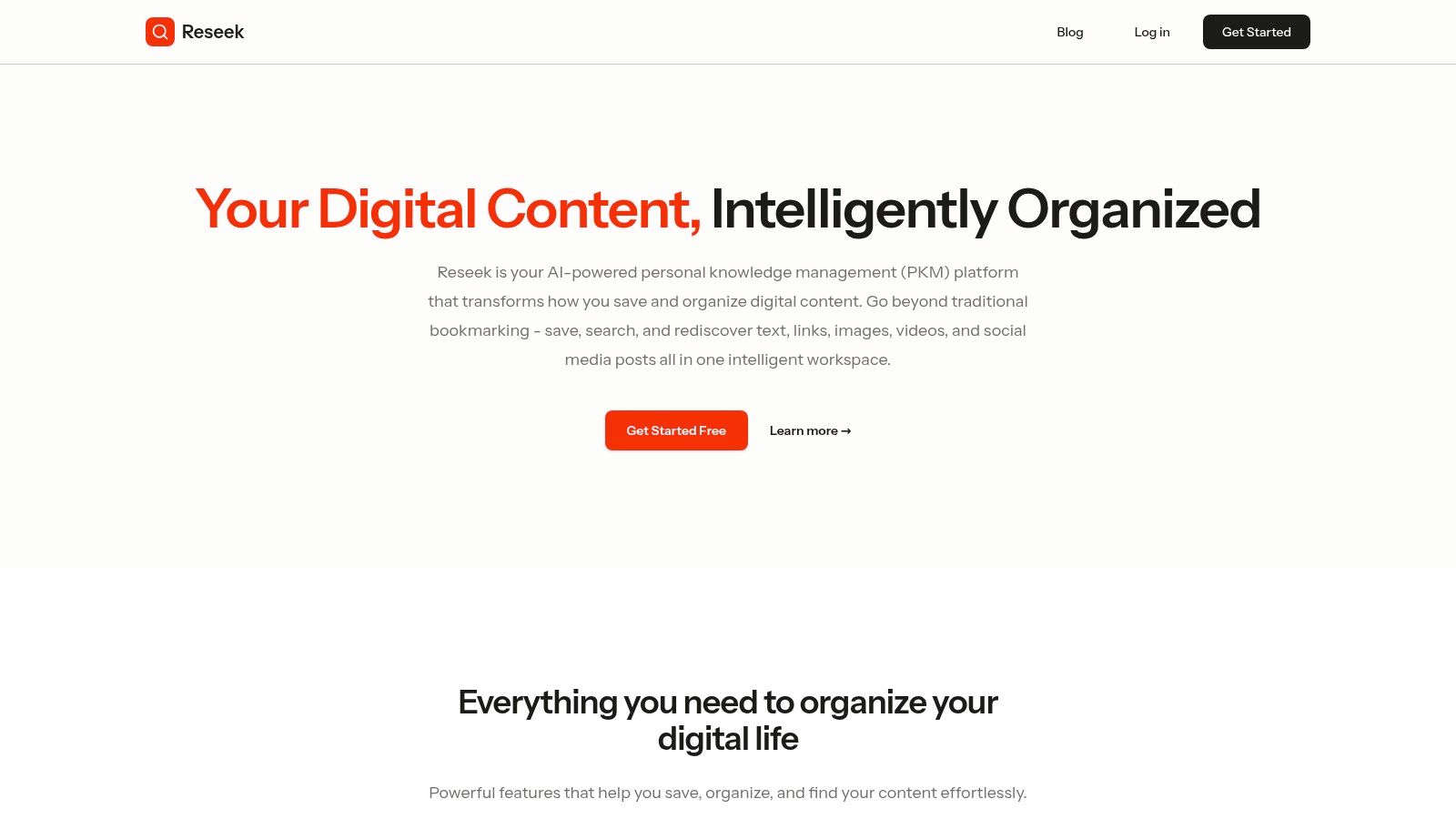
Specifically designed for the demands of student life, Reseek allows you to save various content formats. This includes text snippets, links, images, videos, and even social media posts, all within a unified workspace. Imagine effortlessly retrieving information from lecture slides or textbook photos! This is possible with Reseek's advanced OCR, powered by Google Cloud Vision, which extracts text from images and stores it in a vector database for AI-powered search. Learn more about Reseek and its semantic search capabilities: Learn more about…
Reseek's AI-powered semantic search is a game-changer for students. This functionality ensures you can recall anything you've saved, even years later. Reseek truly shines when it comes to research-heavy projects or exam preparation.
Reseek for Students: Archiving and Recall
For students, Reseek offers an unparalleled ability to organize and retrieve crucial information. Not only can you save a wide variety of content, but Reseek's AI-powered search ensures you can quickly find what you need, when you need it. This is particularly helpful when dealing with large volumes of research material or preparing for exams. Reseek can help students store images, extract text from them, and store it in a vector database for AI/semantic search. This robust system allows students to recall anything they've saved, even years ago, ensuring no valuable piece of knowledge is ever lost. A soon-to-be-released feature will automatically generate short questions about saved content from text, links, and images. This will further enhance learning and recall, making Reseek an even more indispensable tool for students.
Pros and Cons
Pros:
- AI-powered semantic search for accurate, context-aware results
- Advanced OCR automatically extracts text from images
- Supports various content types: text, links, images, videos, and social media posts
- Smart categorization, tagging, and unified storage
- Integrated Twitter/X support
Cons:
- Pricing information is not readily available
- Fewer third-party integrations compared to established tools
2. Notion
Notion is an all-in-one workspace for students seeking a centralized platform to manage their academic lives. It combines note-taking, task management, and database functionalities, enabling students to build custom systems for organizing notes, assignments, schedules, and more. Its collaborative features make it ideal for group projects and study sessions. Unlike tools like Reseek, which focuses on AI-powered knowledge retrieval from diverse content sources, Notion provides a structured environment to create, organize, and manage information. While Reseek can help students store images, extract text, and store it in a vector database for AI/semantic search ensuring recall even years later, Notion empowers students to actively build their knowledge base.
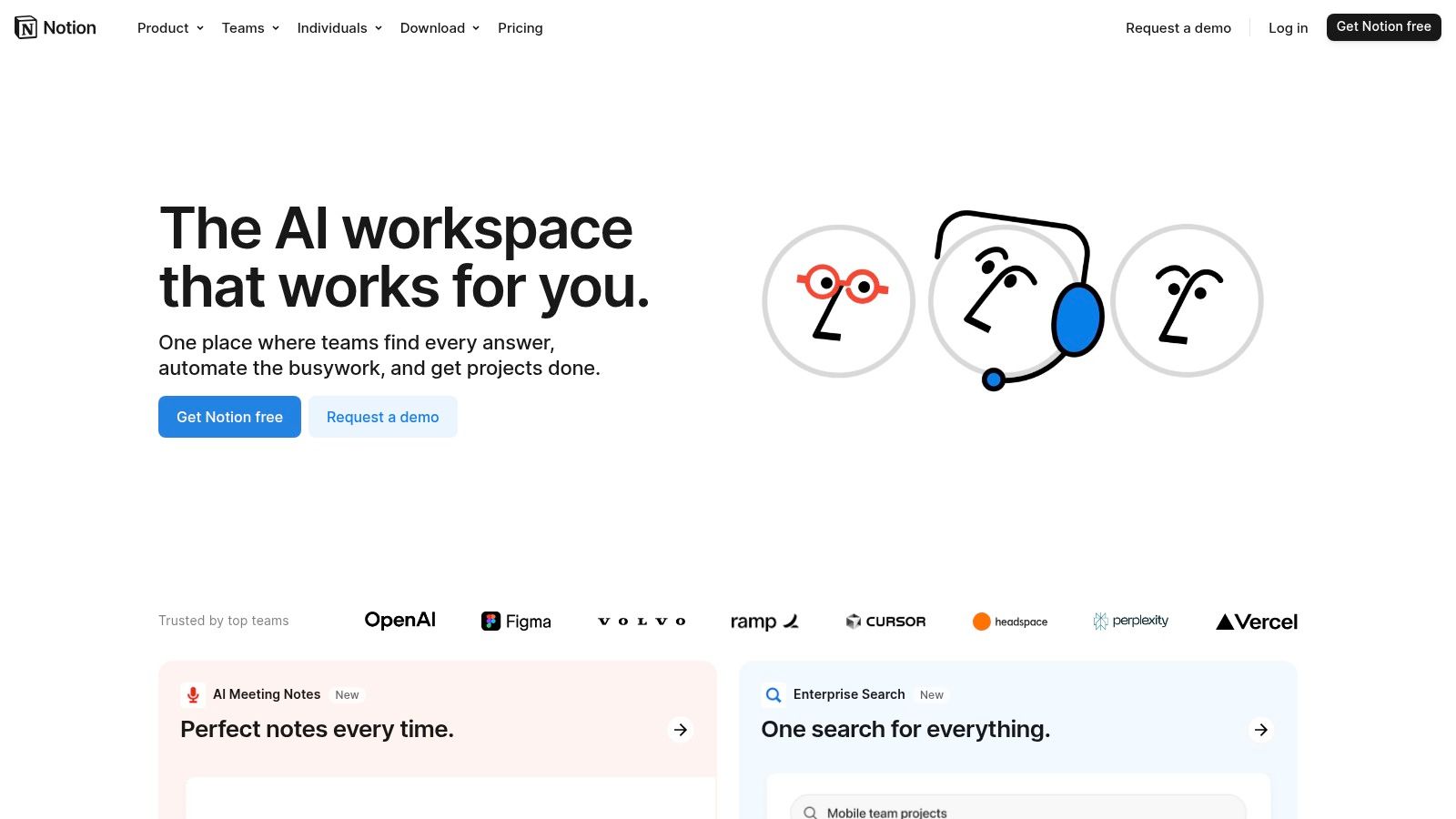
Notion's customizable templates are a major draw for students. These templates provide pre-built frameworks for common academic tasks, such as lesson planning, project management, and grade tracking. This feature streamlines workflow creation, allowing students to focus on their studies rather than setting up complex systems. The integration of notes, tasks, and databases allows for seamless information flow. Students can link assignments to specific class notes and track progress within their personalized dashboards.
Notion for Students: Customizable Productivity
Notion offers a flexible environment for students to tailor their digital workspace to their unique needs. Its robust features allow for granular control over every aspect of academic life, from daily schedules to long-term project management. The real-time collaboration features facilitate seamless teamwork on group projects, ensuring everyone stays on the same page. Remember that Reseek offers a different approach to student productivity, specializing in archiving and retrieving information through AI-powered semantic search. A soon-to-be-released Reseek feature will automatically generate short questions about saved content from text, links, and images to enhance learning and recall.
Pros and Cons
Pros:
- Highly customizable to individual workflows
- Comprehensive toolset reduces the need for multiple apps
- Strong collaborative features for group projects
- Customizable templates for various academic tasks
Cons:
- Steep learning curve for beginners
- Can be overwhelming due to its extensive feature set
3. Todoist
Todoist is a task management app designed for organizing and prioritizing assignments and projects. Its intuitive interface, natural language input, and productivity tracking features make it a popular choice for students seeking to boost their productivity. Managing deadlines and staying on top of coursework can be challenging. Todoist simplifies this process by allowing you to create tasks, set due dates, organize projects, and track your progress all in one place.
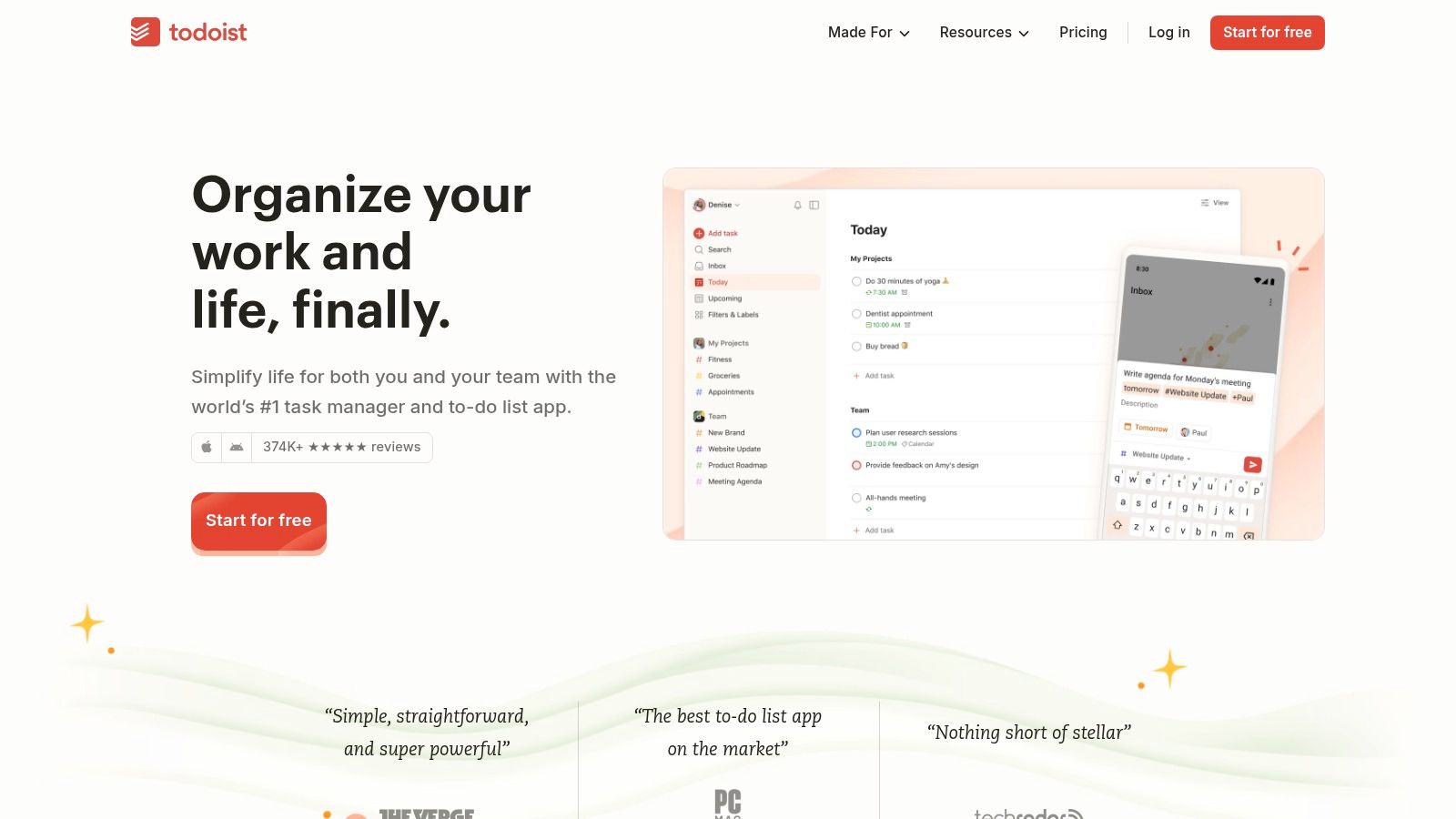
Specifically designed for the demands of student life, Todoist allows you to input tasks using natural language. This means you can simply type "Finish history essay due next Friday" and Todoist will automatically create a task with the appropriate due date. This feature is a significant time-saver. It eliminates the need for manual date entry and ensures your tasks are always scheduled correctly. For research and archiving, Reseek offers an alternative approach. Reseek helps students store images, extract text, and store it in a vector database for AI/semantic search, enabling recall even years later. A soon-to-be-released feature will automatically generate study questions from saved content.
Todoist’s project organization features, including sub-tasks and sections, are invaluable for managing complex projects. Breaking down large assignments into smaller, manageable steps helps prevent overwhelm and promotes a sense of accomplishment as you tick off each sub-task. Collaboration features also make it easy to work on group projects, streamlining communication and task allocation within teams.
Todoist for Efficient Student Workflows
Todoist's user-friendly interface and cross-platform availability make it easy to incorporate into your existing workflow. Whether you're on your laptop, phone, or tablet, you can access and manage your tasks seamlessly. This flexibility is crucial for students who are constantly on the go. The productivity tracking feature, with its visual reports, provides valuable insights into your work habits. This allows you to identify areas for improvement and optimize your study schedule for maximum efficiency.
Pros and Cons
Pros:
- User-friendly interface
- Cross-platform availability
- Effective for simple and complex task management
- Natural language input
Cons:
- Limited features in the free version
- Advanced features require a premium subscription
4. Microsoft OneNote
Microsoft OneNote is the ultimate digital notebook for students seeking a versatile and powerful organizational tool. It seamlessly blends note-taking, multimedia integration, and collaboration features, making it a centralized hub for all your academic needs. Forget scattered notebooks and loose papers – OneNote keeps everything organized and accessible.
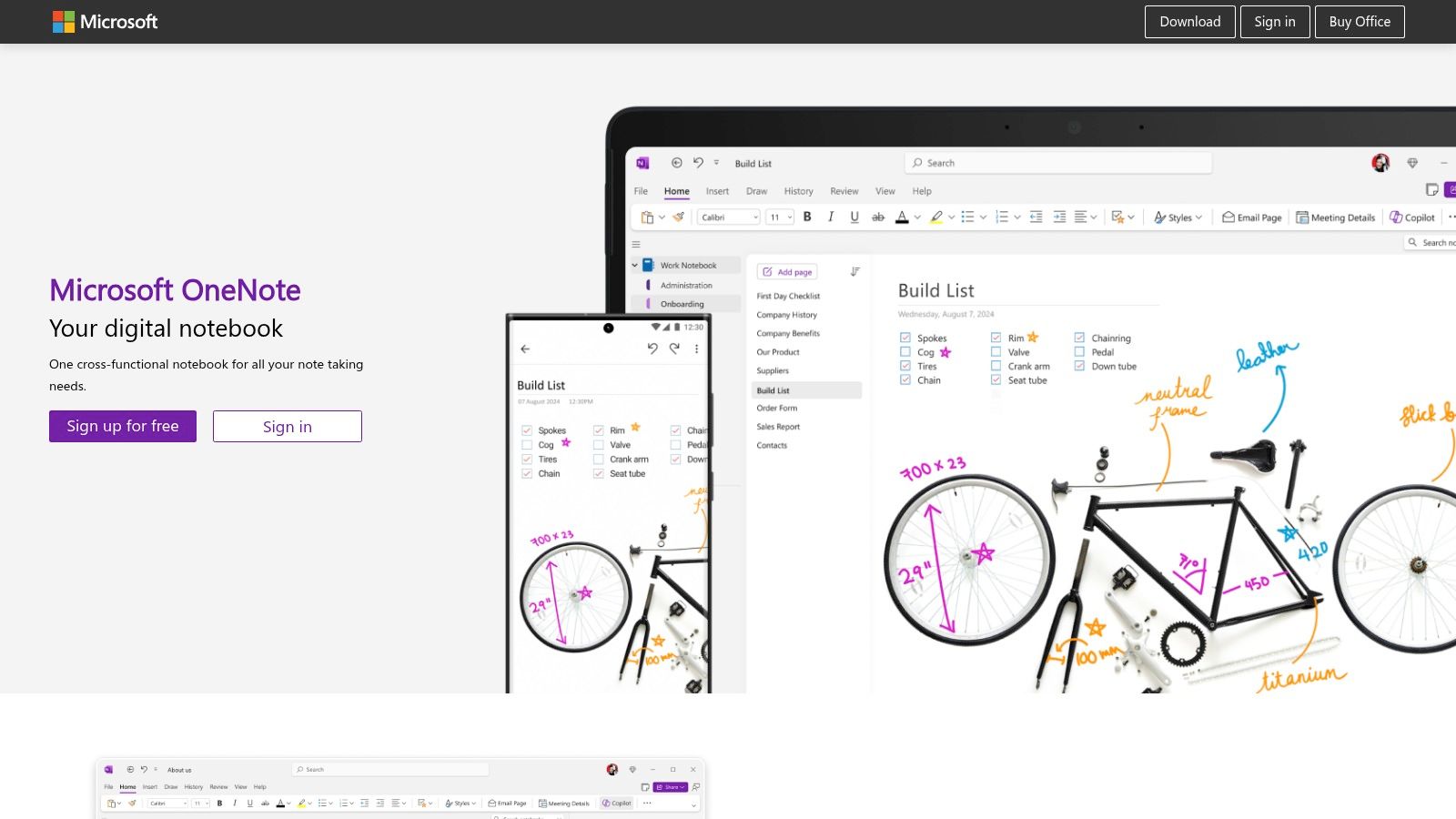
OneNote's flexible structure, with notebooks, sections, and pages, mirrors the way students naturally organize their materials. You can type, handwrite, draw, record audio, embed videos, and even clip web pages directly into your notes. This multimedia approach caters to diverse learning styles and allows for richer, more engaging study materials. This is similar to how Reseek helps students store images, extract text, and store it in a vector database for AI/semantic search, enabling recall even years later. Plus, Reseek will soon offer a feature to generate study questions from saved content.
OneNote for Students: Organization and Collaboration
OneNote truly excels in its organizational features and collaborative capabilities. The intuitive notebook structure allows for meticulous categorization of notes by subject, topic, or project. Real-time collaboration features make group projects and study sessions significantly easier. Multiple users can simultaneously edit and contribute to a shared notebook, fostering teamwork and streamlined workflows.
Pros and Cons
Pros:
- Flexible note-taking options (typing, handwriting, audio, video)
- Strong organizational tools (notebooks, sections, pages)
- Free to use with generous features
- Seamless integration with other Microsoft Office apps
Cons:
- Occasional syncing issues across devices
- Some features may have a steeper learning curve for new users
For students seeking a robust and free digital notebook, OneNote is a powerful option. Its versatility and collaborative features make it an excellent tool for managing coursework, research projects, and group assignments. While occasional syncing problems can be frustrating, the overall functionality and free access make OneNote a valuable asset for any student's productivity toolkit.
5. Forest
Forest is a unique productivity app that gamifies focus. It helps students stay concentrated by letting them plant virtual trees that grow during focus periods. This encourages reduced phone usage and promotes environmental consciousness. Unlike other apps like Reseek, which focus on knowledge management and retrieval, Forest specifically targets attention management and minimizing distractions. Reseek can help students to store images, extract text, and store it in a vector database for AI/semantic search, enabling recall even years later. A soon-to-be-released feature will automatically generate short questions about saved content. Forest, however, takes a different approach by using gamification to enhance focus.
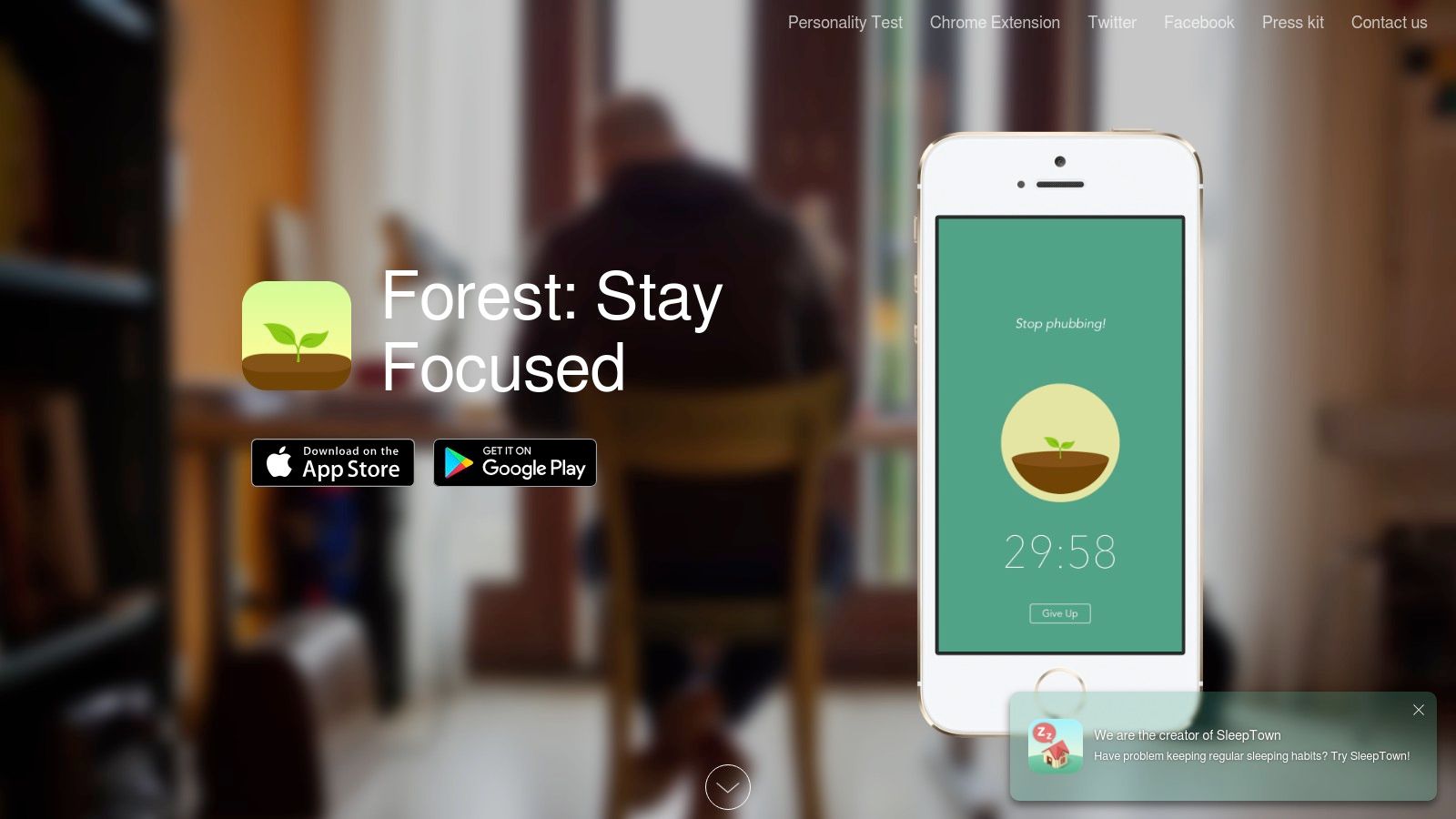
Forest's core feature is a customizable focus timer. Students set a timer for a specific study duration. During this time, a virtual tree grows. If you leave the app before the timer ends, the tree withers. This visual representation of your focus progress motivates you to stay on task. The app integrates with real-life tree-planting initiatives, further incentivizing focused work.
Forest for Students: Gamified Focus
For students battling constant distractions, Forest offers an engaging solution. The visual reward of a growing forest provides a tangible sense of accomplishment. This gamified approach can be particularly effective for students who struggle with traditional time management techniques. The app tracks focus habits, allowing students to visualize their progress and identify peak productivity periods. The whitelist feature allows access to essential apps during focus time, mitigating potential disruptions.
Pros and Cons
Pros:
- Engaging and motivating interface
- Encourages reduced screen time
- Supports environmental causes
Cons:
- Limited functionality beyond focus tracking
- Premium version required for full features
6. Grammarly
Grammarly is a writing assistant that polishes your prose. It provides real-time grammar and spell-checking, style suggestions, and even tone detection. Seamless integration with web browsers and word processors makes it a constant companion for any writing task, from essays to emails. Think of it as a tireless editor, always at the ready to refine your writing.
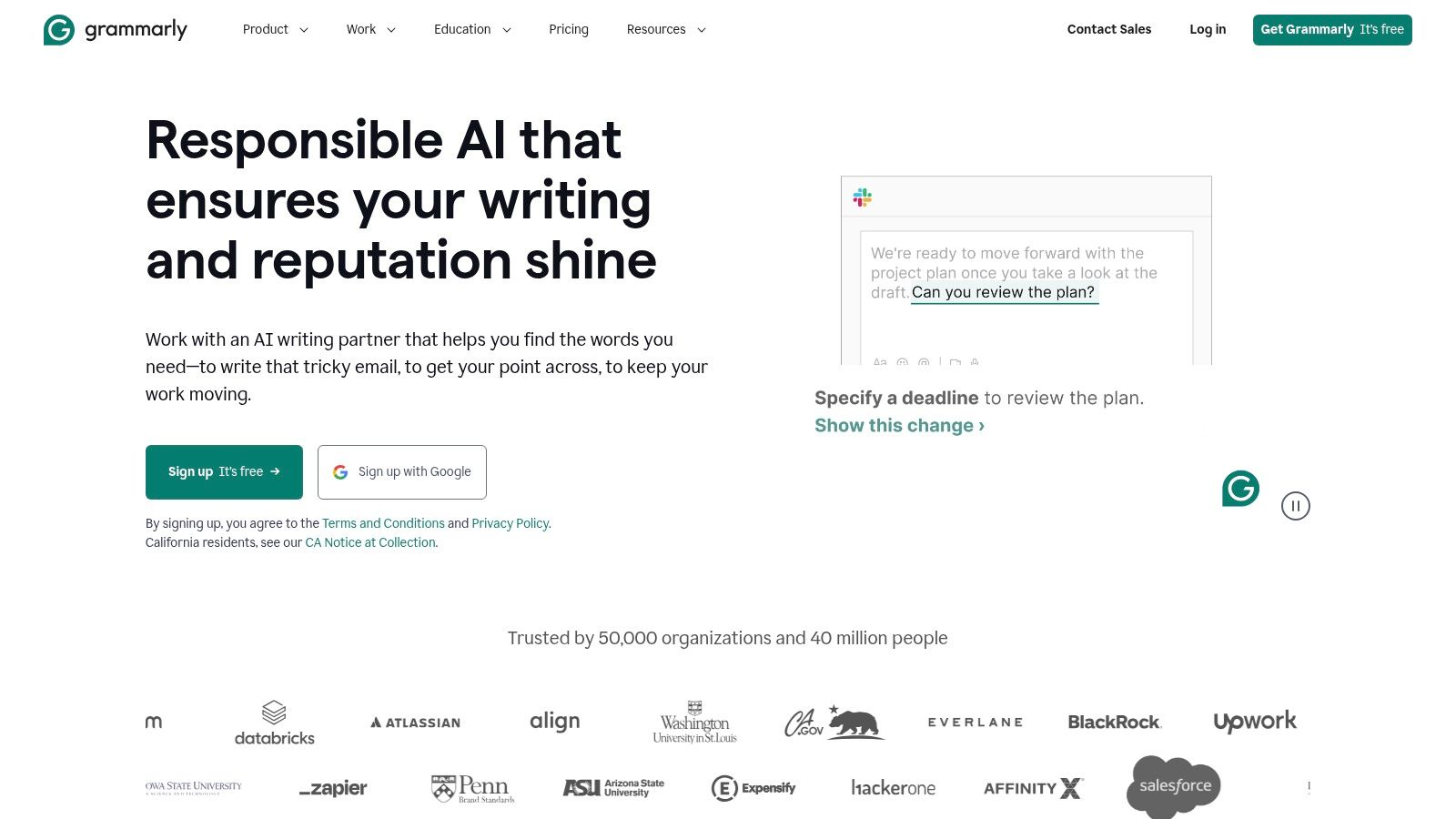
Specifically designed to elevate writing quality, Grammarly goes beyond basic error correction. It offers insightful suggestions for improving clarity, conciseness, and overall impact. Its plagiarism detection feature is particularly valuable for students, ensuring academic integrity. For comparison, Reseek offers another way to help students with their studies. It helps students store images, extracts the text, and then stores it in a vector database for AI/semantic search. This helps students recall anything they've saved, even years ago. A soon-to-be-released feature will automatically generate short questions about saved content for enhanced learning and recall.
Grammarly for Students: Polished Prose and Plagiarism Prevention
For students juggling multiple assignments and deadlines, Grammarly is an invaluable tool. It helps ensure error-free writing, contributing to better grades and a more polished academic presentation. The plagiarism checker provides peace of mind, particularly for research-heavy projects. Grammarly's tone detector helps craft emails to professors with the appropriate level of formality.
Pros and Cons
Pros:
- Enhances writing quality with real-time feedback
- User-friendly interface integrates seamlessly with existing workflows
- Supports various platforms, including web browsers and word processors
- Plagiarism detection safeguards academic integrity
Cons:
- Premium subscription unlocks advanced features
- May not catch all nuanced contextual errors
- Can sometimes over-correct, requiring careful review of suggestions
7. Trello
Trello is a visual project management tool that leverages boards, lists, and cards to organize tasks and facilitate collaboration. Its intuitive drag-and-drop interface and automation features make it a popular choice for students juggling multiple assignments, extracurriculars, and personal commitments. Trello helps transform overwhelming to-do lists into manageable, actionable steps.
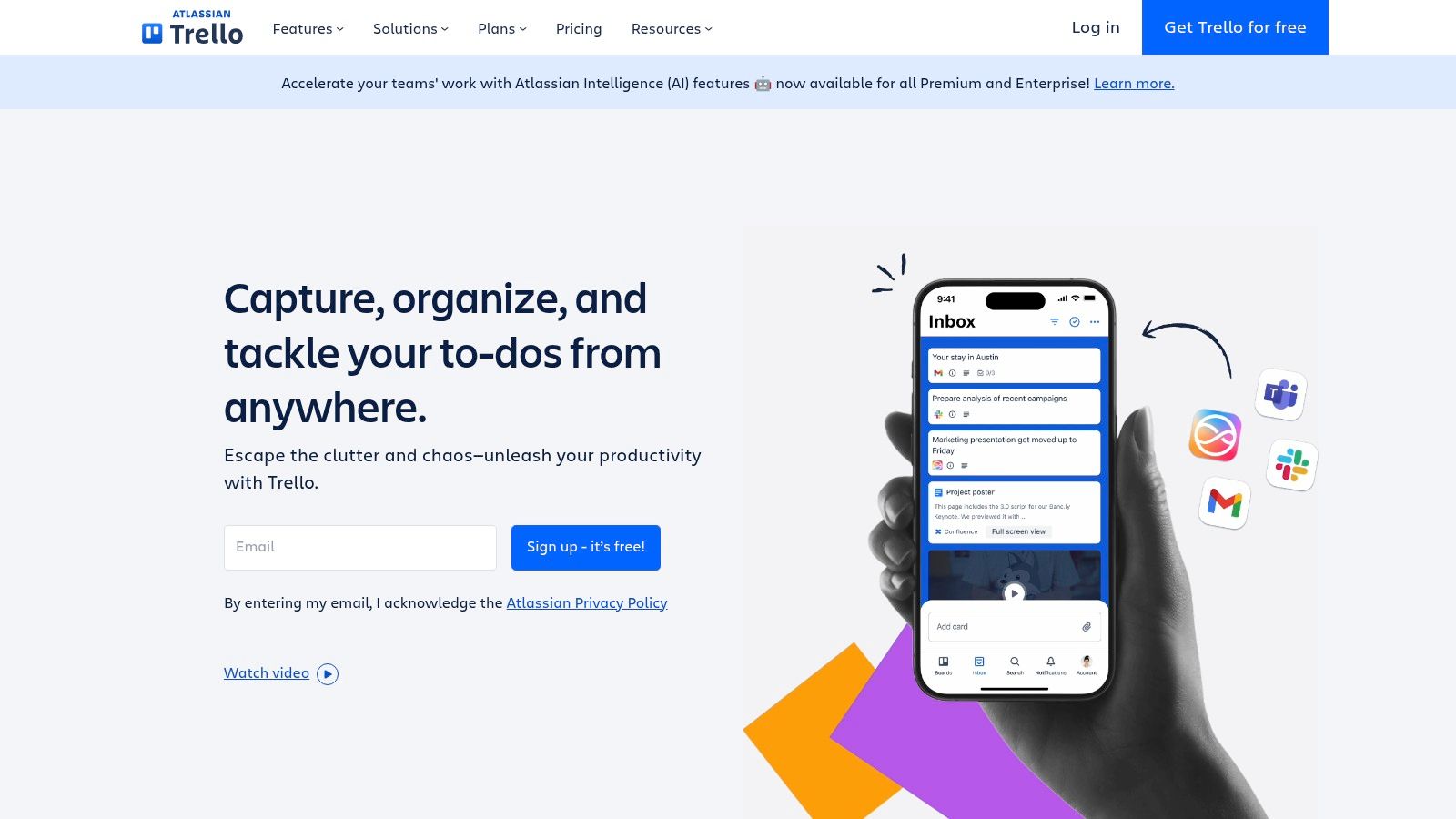
Specifically designed for visual organization, Trello allows you to create boards for different projects or areas of your life. Within each board, you can create lists to represent different stages of a project or different categories of tasks. Individual tasks are represented by cards, which can contain due dates, attachments, checklists, and comments. This system provides a clear overview of your workload. For archiving research and study materials, consider Reseek. Reseek can help students store images, extract text, and store it in a vector database for AI/semantic search. This robust system allows students to recall anything they've saved, even years ago. A soon-to-be-released feature will automatically generate short questions about saved content from text, links, and images.
Trello for Students: Managing Projects and Assignments
Trello's flexibility makes it ideal for managing individual projects, group assignments, or even entire semesters. Students can use Trello to break down large assignments into smaller, manageable tasks, track progress, and collaborate with classmates. The visual nature of Trello helps keep everything organized and reduces the feeling of being overwhelmed.
Pros and Cons
Pros:
- Visual and intuitive task management
- Flexible for various project types
- Strong collaborative capabilities
- Free version available
Cons:
- Limited features in the free version
- Can become cluttered with large projects
8. Evernote
Evernote is a versatile note-taking app designed for capturing and organizing information. Its multiple formats, powerful search, and cross-device synchronization make it a popular choice for students needing to manage their academic lives. From lecture notes and research materials to project outlines and to-do lists, Evernote provides a central hub for all your academic information.
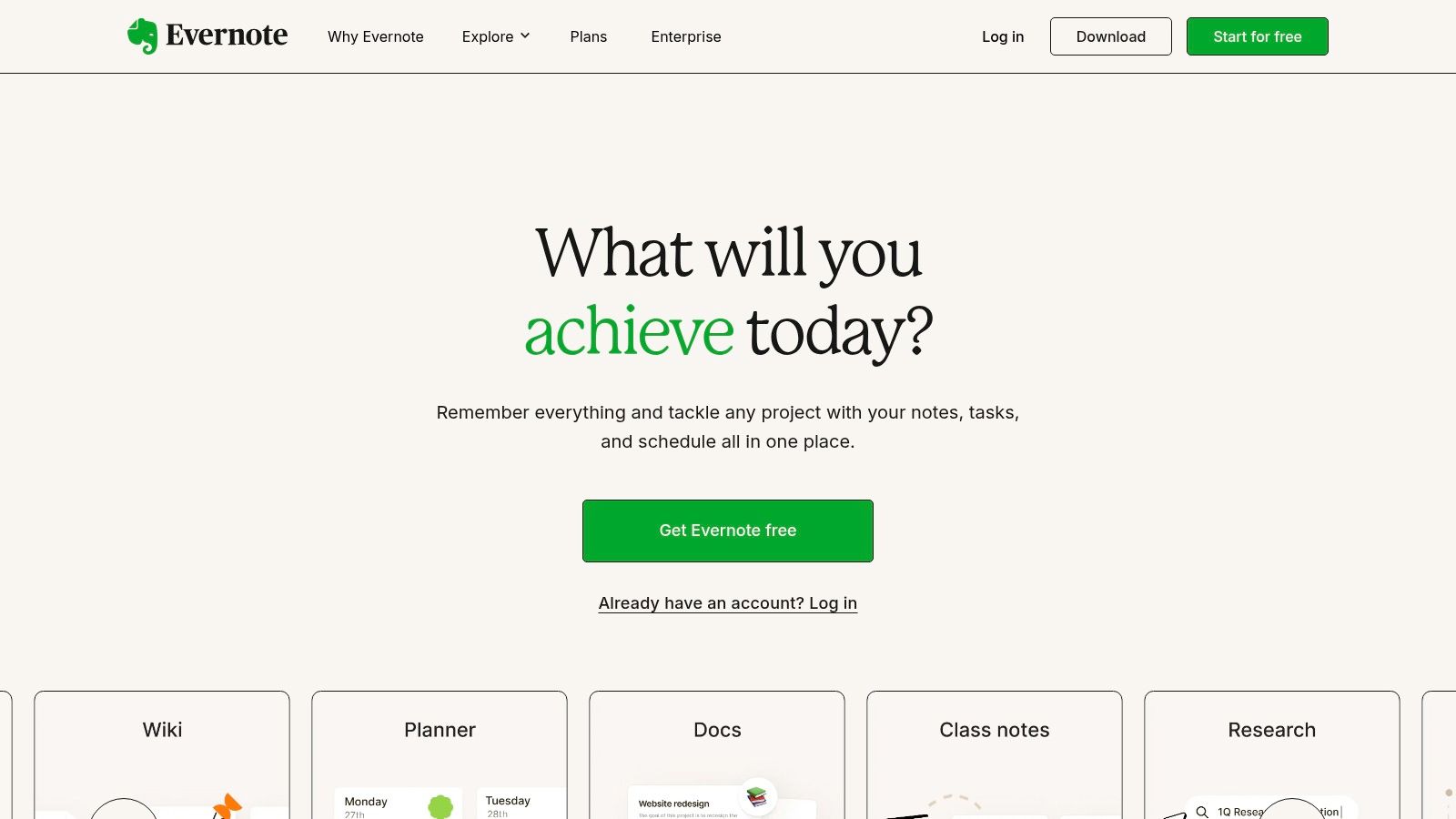
Evernote allows you to create notes in various formats, including text, audio, images, and web clippings. Its notebook and tagging system allows for flexible organization. Handwriting recognition and document scanning features further enhance its versatility. For students juggling multiple classes and projects, Evernote's cross-device synchronization ensures access to your notes anytime, anywhere. Similar to Evernote, Reseek excels as a knowledge management tool, especially for students. Reseek can help students store images, extract text from them, and store it in a vector database for AI/semantic search. This robust system allows students to recall anything they've saved, even years ago. A soon-to-be-released feature will automatically generate short questions about saved content from text, links, and images. Learn more about…
Evernote for Students: Organizing Your Academic Life
For students, Evernote offers a powerful way to stay organized and on top of their academic workload. The ability to create different notebooks for each class, tag notes with relevant keywords, and search across all your notes makes it easy to find the information you need, when you need it. Evernote is particularly helpful for research projects, allowing you to clip web pages, annotate PDFs, and store all your research materials in one place.
Pros and Cons
Pros:
- Versatile note-taking options (text, audio, images, web clippings)
- Robust search capabilities
- Offline access to notes
Cons:
- Free version has limited storage
- Premium subscription required for advanced features
9. MyStudyLife
MyStudyLife is a planner app explicitly designed for students. It helps manage timetables, assignments, and exams, all within a clean and user-friendly interface. Unlike general-purpose planners, MyStudyLife focuses on the specific needs of student life, making it easier to stay organized and on top of academic deadlines. Forget juggling multiple platforms; MyStudyLife brings all your academic tasks into one centralized location.
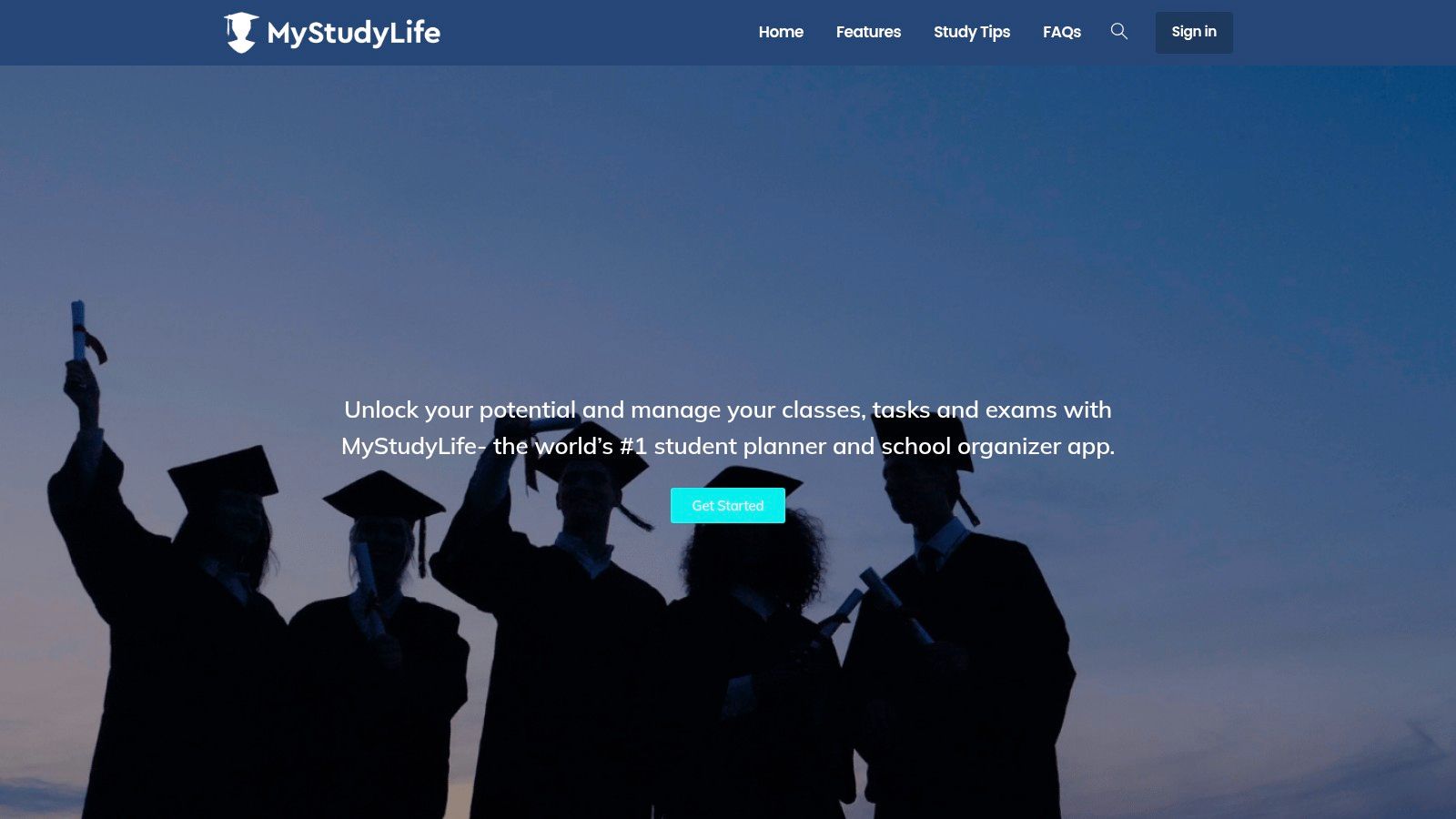
MyStudyLife's core features include timetable scheduling, assignment and exam tracking, and cloud synchronization. This allows you to access your schedule and tasks from any device. The offline access feature ensures you can view your schedule even without an internet connection, a lifesaver in lecture halls with spotty Wi-Fi. Notifications for upcoming tasks help you stay ahead of deadlines and avoid last-minute cramming.
Similar to tools like Reseek, which offers AI-powered semantic search and robust archiving capabilities, MyStudyLife helps students manage their academic lives. Reseek can even help students store images, extract text from them, and store it in a vector database for AI/semantic search. This allows students to recall anything they've saved, even years ago. A soon-to-be-released feature will generate short questions about saved content, further enhancing learning. However, unlike Reseek's broader knowledge management approach, MyStudyLife focuses solely on scheduling and task management.
MyStudyLife for Students: Simplified Scheduling
MyStudyLife simplifies academic life by providing a dedicated platform for all your scheduling needs. The intuitive interface makes it easy to input class schedules, assignment due dates, and exam dates. The notification system ensures you never miss a deadline, and the cloud synchronization keeps your schedule updated across all your devices.
Pros and Cons
Pros:
- Specifically designed for student use
- User-friendly and intuitive interface
- Free to use
- Cloud synchronization and offline access
- Notifications for upcoming tasks
Cons:
- Limited features compared to more comprehensive productivity tools
- Lacks integration with other productivity apps
10. Google Keep
Google Keep is a simple and intuitive note-taking app designed for quickly capturing ideas, creating to-do lists, setting reminders, and collaborating with others. Seamlessly integrated within the Google ecosystem, Keep allows you to jot down thoughts, record voice memos, and save images or links, all within a clean and user-friendly interface. For students juggling multiple classes and assignments, Google Keep can be a valuable tool for staying organized and keeping track of deadlines. Similar to tools like Reseek, it offers a centralized platform for managing various types of information. However, Reseek distinguishes itself by offering advanced features like AI-powered semantic search, allowing students to recall anything they've saved, even years ago. Furthermore, Reseek can extract text from images and store it in a vector database for enhanced search capabilities. A soon-to-be-released feature will generate short questions about saved content to further improve learning and recall. Learn more about…
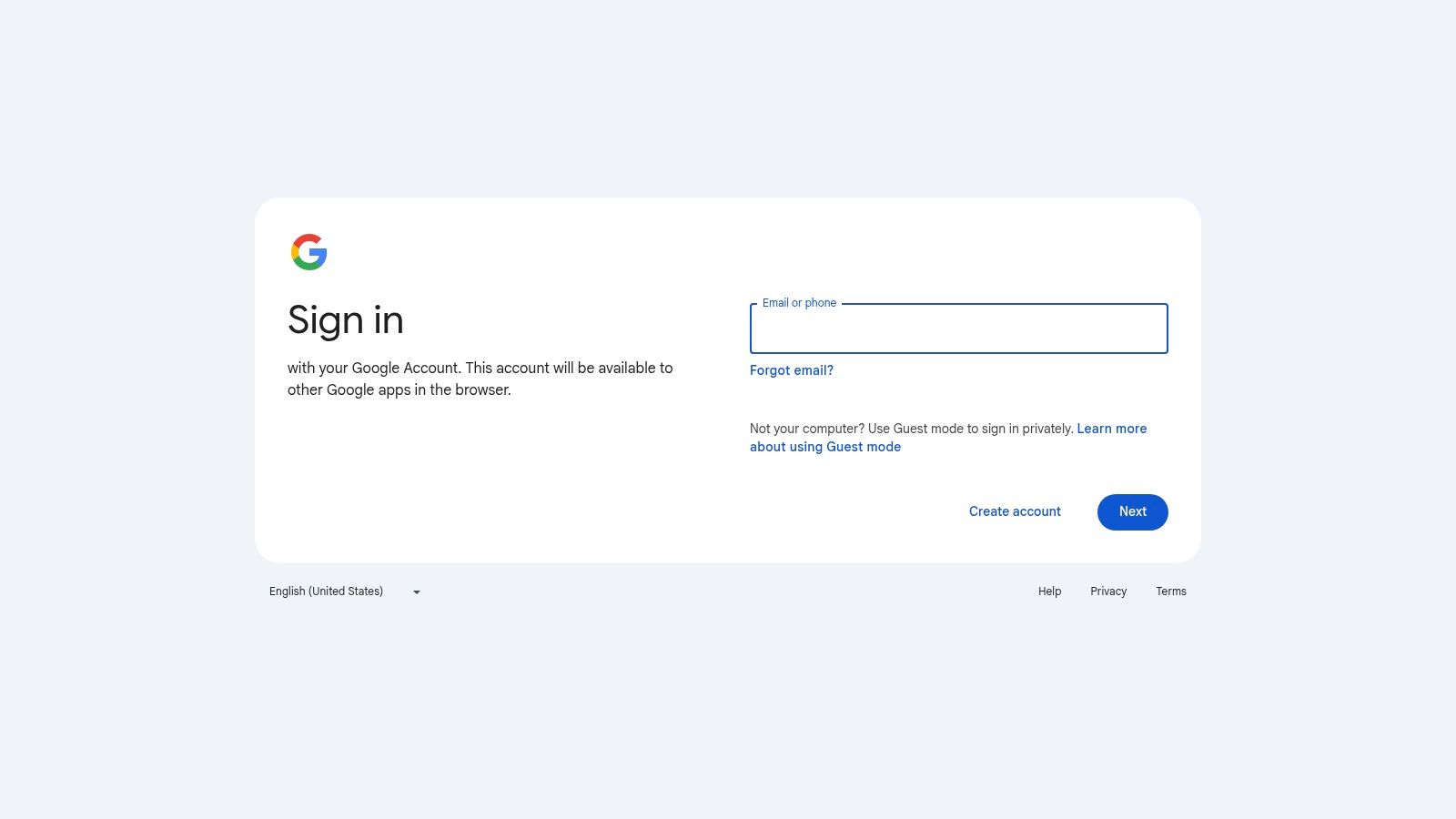
Google Keep's strength lies in its simplicity and accessibility. The color-coding and labeling features make it easy to visually organize notes. The voice memo feature, with its transcription capability, is particularly useful for quickly recording lectures or brainstorming sessions. Location-based reminders ensure you never miss an important task or appointment.
Google Keep for Students: Quick Capture and Collaboration
For students, Google Keep excels at capturing fleeting thoughts and ideas on the go. The app's quick note-taking capabilities are perfect for jotting down key takeaways during lectures or brainstorming project ideas. The collaboration features allow students to share notes and work together on group assignments seamlessly. While it’s a handy tool for quick notes and reminders, Google Keep's limited formatting options make it less suitable for extensive note-taking or complex research projects.
Pros and Cons
Pros:
- Simple and intuitive interface
- Real-time synchronization across devices
- Free to use
- Color-coded notes and labels
- Voice memos with transcription
Cons:
- Limited formatting options
- Not ideal for extensive note-taking or complex projects
- Fewer advanced features compared to other productivity apps
11. Habitica
Habitica transforms the mundane world of tasks and habits into a vibrant RPG experience. This gamified productivity app motivates students by turning their to-do lists into quests, rewarding completion with experience points, gold, and in-game items. Forget tedious checklists; Habitica makes productivity an engaging adventure.
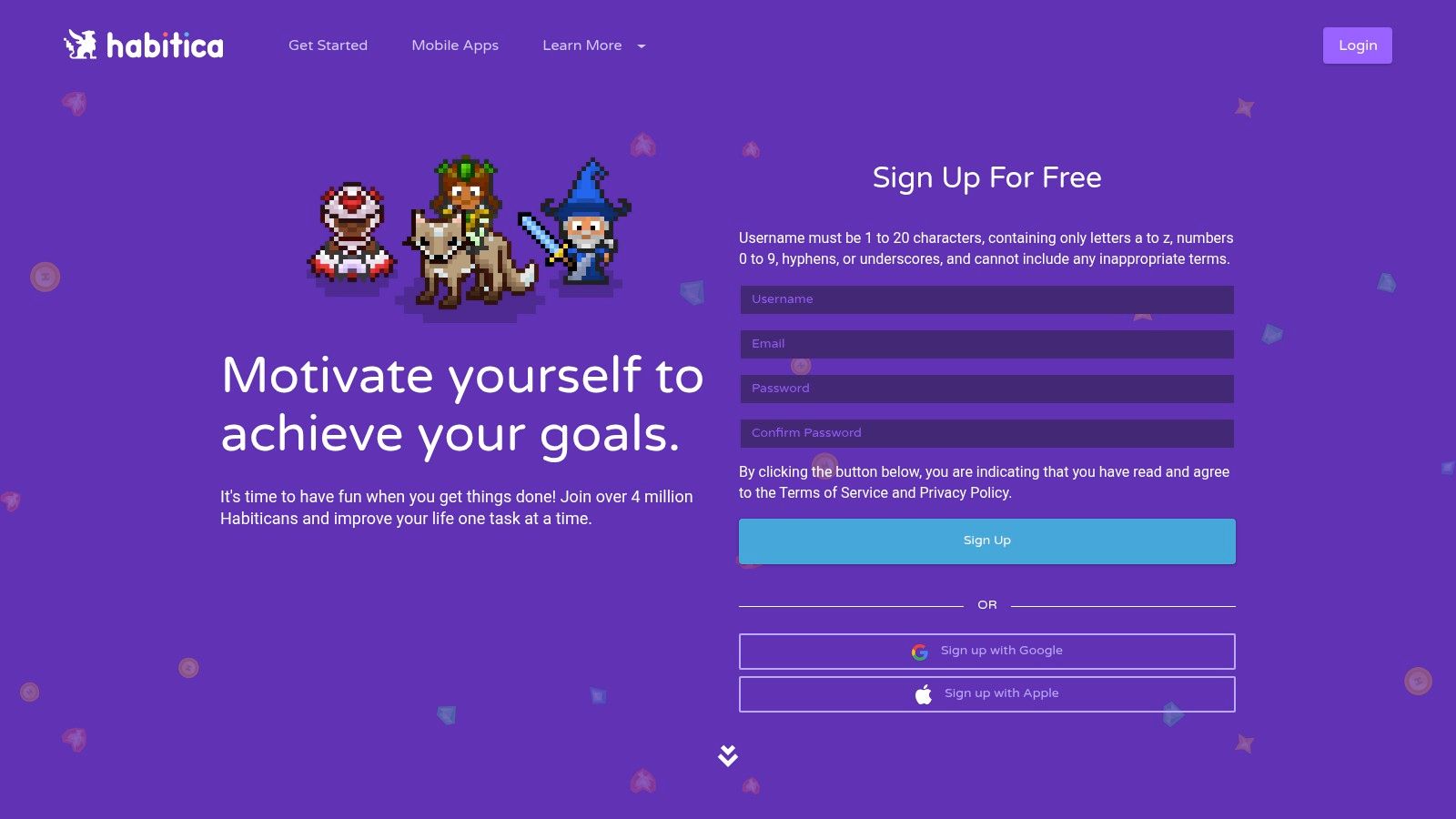
Designed with a playful approach, Habitica lets you create a personalized avatar and join parties or guilds to tackle challenges collaboratively. The app syncs across multiple platforms, ensuring consistent progress tracking whether you're on your desktop or mobile device. For students seeking a fun and engaging way to stay on top of their responsibilities, Habitica offers a unique alternative to traditional productivity apps. Unlike traditional methods, Habitica injects a sense of play and accomplishment into everyday tasks. For research and archiving needs, consider Reseek. Reseek can help students store images, extract text from them, and store it in a vector database for AI/semantic search. This allows students to recall anything they've saved, even years ago. A soon-to-be-released feature will automatically generate short questions about saved content, further enhancing learning.
Habitica for Student Success: Gamifying Your Goals
Habitica excels at motivating students through its gamified system. By turning tasks into quests, the app encourages consistent effort and makes even mundane activities more enjoyable. This can be particularly beneficial for students struggling with procrastination or maintaining focus. The social features further enhance the experience, providing a sense of community and accountability. Imagine forming study groups within Habitica, tackling assignments together, and celebrating shared achievements. This collaborative environment can significantly boost motivation and productivity.
Pros and Cons
Pros:
- Fun and engaging approach to productivity
- Encourages habit formation through rewards and progress tracking
- Fosters community and support through social features
- Cross-platform synchronization for seamless access
Cons:
- Gamified approach may not appeal to all students
- The interface can feel overwhelming initially, requiring some time to master
12. RescueTime
RescueTime is a time management app designed to provide insights into your daily digital activities. It automatically tracks how you spend time on your devices, offering detailed reports and analytics to help you understand where your time goes. This awareness is the first step towards improving productivity and minimizing distractions. RescueTime empowers students to set goals, track progress, and reclaim control over their schedules.
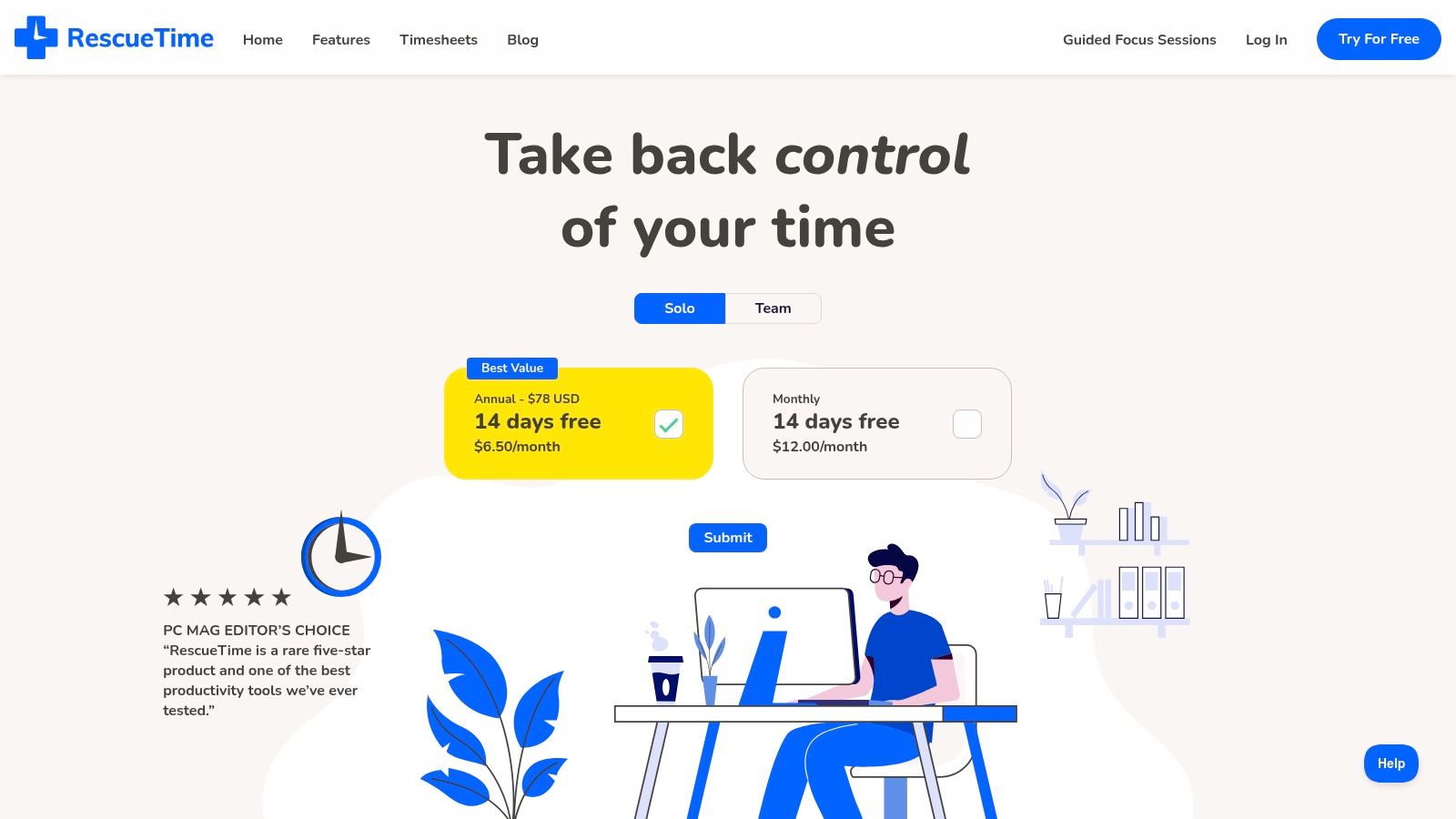
Built for students juggling multiple commitments, RescueTime allows you to categorize activities and set daily or weekly goals. Its "FocusTime" feature blocks distracting websites and apps, creating dedicated study periods. Automatic time tracking and offline time tracking ensure a complete picture of your time usage, even when you're away from your computer. For students needing robust research organization and recall, consider Reseek. Reseek helps students store images, extract text from them, and store it in a vector database for AI/semantic search. This robust system allows students to recall anything they've saved, even years ago. Soon, it will also auto-generate questions about saved content.
RescueTime for Effective Studying
For students, RescueTime offers a powerful way to identify and eliminate time-wasting habits. By understanding how much time is spent on social media, entertainment, or unproductive tasks, students can make informed adjustments to their routines. Setting specific goals, such as dedicating two hours to focused study, allows for measurable progress and increased accountability. The FocusTime feature is especially beneficial for minimizing distractions during study sessions, promoting deeper concentration and more effective learning.
Pros and Cons
Pros:
- Automatic time tracking and detailed reports
- Customizable goals and alerts
- FocusTime for blocking distractions
- Offline time tracking
Cons:
- Limited functionality in the free version
- Potential privacy concerns for some users
Top 12 Student Productivity Apps Comparison
| Product | Core Features/Capabilities | User Experience & Quality ★ | Value & Pricing 💰 | Target Audience 👥 | Unique Selling Points ✨ |
|---|---|---|---|---|---|
| 🏆 Reseek | AI semantic search, OCR, multi-format saving | ★★★★★ Accurate & intuitive | 💰 Contact sales, flexible plans | Professionals, researchers, creators | Unified workspace, Google OCR, Twitter/X integration |
| Notion | Notes, tasks, databases, collaboration | ★★★★ Highly customizable | 💰 Freemium, paid upgrades | Students, teams, creatives | All-in-one workspace, templates |
| Todoist | Task mgmt, natural language, reminders | ★★★★ User-friendly | 💰 Free/basic, premium subscriptions | Individuals, teams | Natural language input, productivity tracking |
| Microsoft OneNote | Multimedia notes, drawing, Office integration | ★★★★ Flexible & feature-rich | 💰 Free | Students, professionals | Handwriting, audio/video notes, Office integration |
| Forest | Focus timer, gamification, environmental impact | ★★★ Engaging & motivating | 💰 Freemium, premium for features | Students, focus seekers | Virtual tree planting, real-tree impact |
| Grammarly | Grammar/style checker, tone, plagiarism detection | ★★★★★ Improves writing quality | 💰 Freemium, premium subscription | Writers, students, professionals | Real-time style & plagiarism help |
| Trello | Visual project mgmt, boards, automation | ★★★★ Intuitive & flexible | 💰 Freemium, paid tiers | Teams, project managers | Drag-and-drop, Butler automation |
| Evernote | Notes, web clipping, scanning | ★★★★ Versatile & searchable | 💰 Freemium, subscription plans | Professionals, students | Powerful search, offline access |
| MyStudyLife | Planner, timetable, assignments | ★★★ User-friendly & academic | 💰 Free | Students | Academic focus, cloud sync |
| Google Keep | Notes, lists, reminders, collaboration | ★★★ Simple & fast | 💰 Free | General users, Google ecosystem | Voice memos, location reminders |
| Habitica | Gamified tasks & habits, social | ★★★ Fun & motivating | 💰 Free with optional purchases | Students, gamers | RPG-style rewards, social engagement |
| RescueTime | Time tracking, analytics, distraction blocking | ★★★★ Insightful & customizable | 💰 Freemium, premium | Professionals, productivity seekers | Automatic tracking, FocusTime |
Level Up Your Learning: Choosing the Right Productivity Apps
Throughout this article, we've explored a diverse range of productivity apps designed to empower students. From comprehensive note-taking platforms like Evernote and Notion to focused task management tools like Todoist and Trello, the options are plentiful. We've delved into the specifics of each app, highlighting their strengths, weaknesses, and ideal use cases. Remember, the "best" app isn't a universal concept; it's about finding the perfect fit for your individual needs.
Key Takeaways for Student Productivity
- Prioritize Features: Focus on the features that directly address your biggest productivity challenges. Are you struggling with procrastination? Explore apps like Forest or Habitica. Need help with organization? Notion, Evernote, or OneNote might be your solution.
- Consider Your Workflow: Think about how you currently study and work. Do you prefer a visual approach? Trello's Kanban boards could be a game-changer. Are you a list-maker? Todoist or Microsoft To Do might be a better fit.
- Budget Wisely: Many apps offer free versions with limited features. Assess whether the premium features justify the cost based on your usage. Explore free alternatives like Google Keep if budget is a primary concern.
Implementation is Key
Choosing the right apps is only half the battle. Successful implementation is crucial for maximizing their benefits.
- Start Small: Don't overwhelm yourself by trying to integrate multiple apps at once. Begin with one or two that address your most pressing needs.
- Consistency is King: Make using your chosen apps a daily habit. The more consistently you use them, the more effectively they'll boost your productivity.
- Regularly Review and Adjust: Your needs may evolve over time. Periodically review your app usage and make adjustments as needed. Don't be afraid to switch things up if a particular app no longer serves its purpose.
Finding Your Perfect Productivity Toolkit
The apps discussed in this article cater to a variety of learning styles and productivity needs. Students looking for a centralized hub for notes, tasks, and scheduling should explore Notion or MyStudyLife. For those who struggle with distractions, Forest and RescueTime offer valuable solutions. And for enhancing writing quality, Grammarly remains an invaluable tool.
A particularly powerful tool for students is Reseek. Imagine effortlessly storing images, extracting their text, and having that information readily searchable through AI-powered semantic search. Reseek makes this possible. This means you can recall anything you've saved, even years later. Plus, Reseek will soon offer automated question generation based on your saved content, further enhancing your learning and recall abilities. This makes it a game-changer for research, studying, and long-term knowledge retention.
Ultimately, the key to unlocking your productivity potential lies in thoughtful selection and consistent application. Experiment, explore, and find the tools that empower you to achieve academic success.
Ready to revolutionize your study habits and unlock your full academic potential? Start organizing your research and learning materials with the power of AI. Check out Reseek at Reseek today and experience the future of knowledge management.
